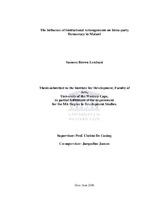The influence of institutional arrangements on intra-party democracy in Malawi
Abstract
This research study seeks to investigate how institutional arrangements impact on intra-party democracy in Malawi. Intra-party democracy is essential as it promotes party unity through reduced fragmentation and factionalism, encourages a culture of democratic debate and deliberation of critical issues within the party and therefore collective ownership of decisions. Further, it creates legitimate internal conflict management systems and finally, reduces opportunistic and arbitrary use of delegated authority. These are fundamental tenets of any functioning democratic entity. These elements of intra-party democracy are attainable if they are formerly stipulated and governed by the party’s constitutional rules. Where such rules either do not exist or are not effectively enforced, major operational problems arise. These may include: non-inclusive candidate selection procedures, centralised coalition negotiation processes, unprocedural conflict management mechanisms and unconstitutional or illegitimate party conventions. Consequently, the resulting outcomes include party instability and factionalism stimulated by resignations and expulsions, declining electoral support and weak coalitions. These factors undermine the party’s contribution to democracy. The next section gives the context and historical evolution of parties in Malawi.

